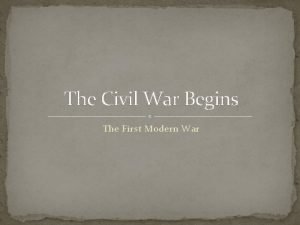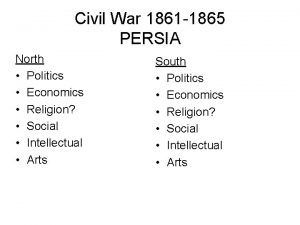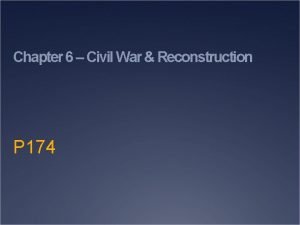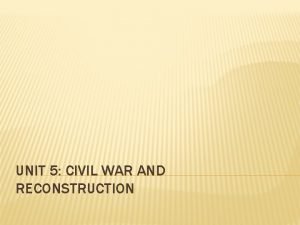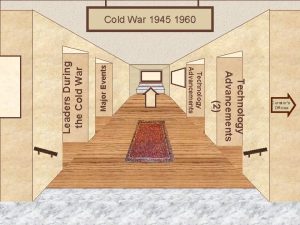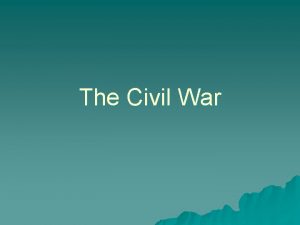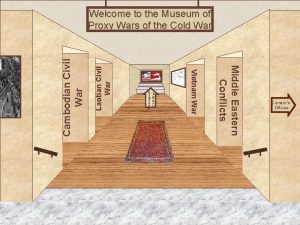Medical Advancements of the Civil War And How
















- Slides: 16

Medical Advancements of the Civil War And How They Have Revolutionized Modern. Day Medicine and the Procedures That Take Place

Before Entering the War America, not having a major in 80 years (the American Revolution), were not medically up-to-date, because there was not a real need for it because of no wars. The people would usually use herbs or natural substances to heal certain diseases. In the case of diseases that sometimes require amputation, such as Gangrene, Anesthesia was not used, and the doctors would use a saw and some whiskey to make the patient drunk. They would then put a towel in the patients mouth, to reduce the gnashing of their teeth and be rid of the screaming. They would also have to tie them down.

Before Entering the War Sanitization was not used at all. The doctors and people at the time still did not know that germs and bacteria are the cause of infection and some diseases. Rarely would the doctor actually wash his/her hands before operating on a patient (even for open wound operations or things to do with the mouth). No Antibiotics or Antiseptics have even been made yet. No records were used when patients came in and were treated for whatever disease they thought they may have had. As demonstrated in John Adams, there was the known that the body could react to certain diseases if they come in contact with them (vaccines today). The Doctor would cut into the patients skin and physically put a remnant of tissue from a previous dead patient and impute the bacteria into the patients bloodstream (small pox).

Beginning of the War A man named Jonathan Letterman revolutionized surgery and medicine as we know it. He was the first to tell everyone to start a series of clinics so they could actually take injured troops to it to be treated. Jonathan Letterman soon implemented Anesthesia, as they needed something to treat the agonizing troops with something other than liquor. Because of this, Anesthesia was considered a specialty if the hospital tents had it. It was much better than liquor at sedating the patient.

Beginning of the War: Anesthesia literally means “without sensation” from the greek “an-” meaning without and “aisthesis” meaning “sensation”. Combined, it means “without sensation”. Anesthesia made amputation and many other procedures much easier. Instead of tying the patient down and getting he/she drunk, they could now operate without having to do so, and the patient can’t feel a thing. Also, with the use of Anesthesia, breakthroughs in discovery and function of the nervous system soon came along after.

Beginning of the War: Anesthesia The surgeons and medics on the battlefield learned a great amount of information about the Nervous System and its response to injuries and occurrences. They learned that certain substances (a. k. a. hormones) affected parts of the body in different ways. They had no idea that it was due to the geometric shape of the molecules affected how they worked in the body. Because of these observations of substances (hormones) working in the body, it lead to many questions as to why they had that affect on the body, which lead to many people to discover many of the things that occur in the endocrine system that we know of today.

Beginning of the War: Sanitization As said before, the Americans (or anybody at the time) did not understand that germs caused infection. So washing one’s hands was not widespread. Also, cleaning tools was not done, because it didn’t matter (to them) that a remainder of another person’s gangrene still remained on the tool they are amputating with on another person. Fortunately, Surgeons and Medics starting seeing a trend throughout the war, seeing that if they had sanitary tools and had washed their hands, the patient would not get a disease as a result of their operation as often. Later, of course, we figured out that sanitization was very important while doing a medical procedure.

During the War: Transportation Because of the awesome destruction of the cannons and weapons of the time, many soldiers were wounded, as with any war. However, so many were so badly hurt, they didn’t have enough surgeons and doctors to rush out into combat and tend to the troops that needed treatment. So the first ambulances were made.

During the War: Transportation As a result of the ambulance in action, there was a much higher influx of injured soldiers, since they didn’t die in combat before the limited amount of surgeons could operate in combat. So, Hospital Tents were constructed on the site of the outpost of the Union or Confederacy.

During the War: Medical Tools

During the War: Medical Tools Although it may seem like the surgeons and medics had a good idea on what they were doing, they really did not. All these inventions were new and foreign, and the only other place they would use a saw is in cutting a tree or some wood. Now its human limbs. The bullet extractors were never used before, because people would literally use knives and basically kitchenware before the war to take out bullets. Using knives on a mass amount of soldiers did way more harm than good, so something new was needed, and it happened to be bullet extractors.

During the War: Procedures Because of the lack of familiarity with the new tools of the time, the procedures were also new. Because of that, the procedures were extremely primitive and barbaric. The most used tool, according to most historians, was the bone saw. Amputations were quite often, because either the wound was too badly infected or the tissue was too cut up by the doctors, so it would be better just to cut it off.

During the War: Procedures After an amputation, they would send the soldier back into battle in a couple of days. No matter how painful, they needed men, so crutches were implemented. If the arm was amputated, however, they would not let you fight. You were more of a hindrance because reloading your gun would be extremely ineffective and requires both arms. Nowadays, if the soldier is fit to go back to war, the soldier would wait 3 -4 weeks before going back to war, whereas these people would go back in as little as 3 days.

Post-War Effects Anesthesia is excessively used today, every hospital has it, and if it was not for the Civil War, we may not have found out about anesthesia until many years later, and we may not have been able to figure out its full potential. Because of Anesthesia, that alone sparked many new discoveries and observations about the human body, which lead to many breakthroughs in the understanding of the human body.

Post-War Effects The procedures have been greatly improved since then, as surgeons do sanitize excessively and vigorously before a surgery. The tools themselves are kept extremely clean to not risk infection. Gloves are worn in surgery, as before, no gloves were used. Instead of the fastest doctor being the best, nowadays, surgery takes much longer, and requires much more precision, but makes for a better outcome for the patient, instead of highly risking of infection and death during a surgery.

How Greatly Has the Civil War Impacted Medicine? Greatly! Without it, we could have been extremely ignorant of many things that happen in the body, and if we were to figure them out later, we would be way behind where we are now. The Civil War revolutionized Medicine as a whole, from the functions themselves of the human body and the procedures on how to fix problems with the body.
 Toward civil war lesson 3 secession and war
Toward civil war lesson 3 secession and war Civil war first modern war
Civil war first modern war Advancements in solar energy
Advancements in solar energy Civil rights and civil liberties webquest
Civil rights and civil liberties webquest Civil war advantages and disadvantages chart
Civil war advantages and disadvantages chart Unit 4: civil war and reconstruction
Unit 4: civil war and reconstruction Civil war and reconstruction study guide
Civil war and reconstruction study guide Civil war advantages and disadvantages chart
Civil war advantages and disadvantages chart Civil war advantages and disadvantages chart
Civil war advantages and disadvantages chart North and south states civil war
North and south states civil war North and south states civil war
North and south states civil war Chapter 6 civil war and reconstruction
Chapter 6 civil war and reconstruction Remembering world war 1 achieve 3000
Remembering world war 1 achieve 3000 Ppt
Ppt Unit 5 civil war and reconstruction
Unit 5 civil war and reconstruction Unit 5 civil war and reconstruction
Unit 5 civil war and reconstruction Picasso spanish civil war
Picasso spanish civil war

